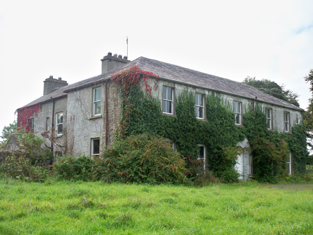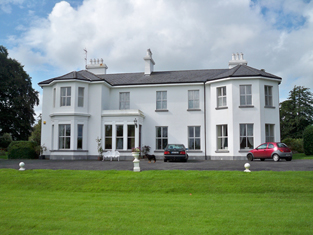Athenry House
Houses within 5km of this house
Displaying 20 houses.
Houses within 5km of Athenry House
Displaying 20 houses.
| House name | Description | |
|---|---|---|
| Rockfield House | Melvin states that throughout the 18th and 19th centuries the house at Rockfield was occupied by Burkes, Brownes, Blakes and Concanons. At the time of Griffith's Valuation it was occupied by Patrick J. Blake and was valued at £26. In 1837 Lewis recorded it as the home of M. Browne. Wilson, writing in 1786, refers to it as the seat of Michael Browne. In 1906 it was owned by Richard A. Nugent when it was valued at £27. The Encumbered and Landed Estates Court sale notices give the impression that the house was sometimes known as Rockville. Though the house no longer survives the gate lodges are still occupied. |

|
| Castle Ellen | Castle Ellen was built in 1810. It is described as the property of Captain Lambert in the Ordnance Survey Name Books. At the time of Griffith's Valuation it was owned by Walter Lambert and was valued at £21. In 1906 it was owned by the representatives of Peter F. Lambert at which time it was valued at £35. It is still extant and occupied. For more information see www.castleellen.com. For more information on the genealogy of the Lambert family see http://www.familylambert.net/History/index.htm |

|
| Castle Lambert | Castle Lambert was built in the later 18th century. At the time of Griffith's Valuation it was owned by Walter Lambert and was valued at £20. It is no longer extant, only the bell tower in the yard remains. |

|
| Newford | In 1786, Wilson mentions Newford as the seat of Edward Browne. In 1814 Thomas Tighe is recorded as residing at Newford. Patrick Fitzpatrick of Newford House, Athenry is listed as a subscriber to ''Lewis' Topographical Dictionary'' (1837). The house was later part of the Whaley and Perry estates in the 1850s and was offered for sale in the Encumbered Estates court in 1852. Portion of Newford later bacame incorporated into Mellows Agricultural College farm. The house is no longer extant. | |
| Prospect | Prospect Lodge is recorded as the residence of T. Burke in 1814. At the time of Griffith's Valuation it was leased by Thomas Courtney to John Lopdell. It is still extant and occupied. |

|
| Castleturvin | Francis Bruen was leasing Castleturvin to Reverend Mark Perrin at the time of Griffith's Valuation. The Ordnance Survey Name Books claim that the Turvin family were the proprietors in the 1830s. Castleturvin House is still extant and occupied. The entrance gate indicates that the house dates from 1767. |

|
| St. John's | This house was built later in the nineteenth century. It appears as "St. John's" on the 25-inch Ordnance Survey Map of the 1890s. The Corbishley family occupied St. John's until the early twentieth century when an auction was held on the premises. The property was purchased by the Finn family but members of the Corbishley family remained living in the house for some years afterwards. St. John's remained the property of the Finn family until later in the twentieth century. In 2005 it was sold. Extensive works have since been carried out at the entrance including new gates and railings. | |
| Cullairbaun | Occupied by James Perry at the time of Griffith's Valuation. | |
| Willmount | Willmount House leased by Thomas Mahon from William Smith at the time of Griffith's Valuation when it was valued at £10. In the 1870s Henry Morgan, who owned over 200 acres in county Galway, was residing at Willmount. In 1906 it was the property of John McCoy. The original house appears not to have survived though there is evidence of a farm yard and walled garden close to Willmount Graveyard. Extensive modern farm buildings exist on the site. | |
| Rockmore or Blakeland Lodge | . This property is named as Blakeland Lodge on the 1st edition OS Map and in the Ordnance Survey Name Books.It appears as Rockmore on the 25-inch map of the 1890s. At the time of Griffith's Valuation it was occupied by William Kelly and valued at £15. In 1906 it was the property of Raymond Kelly and was still valued at £15. It is still extant and has recently been renovated. |

|
| Tallyho Lodge | Tallyho Lodge was the home of Burton Persse, Sen, in the 19th century. The house is no longer extant but traces of the walled garden remain. |

|
| Bingarra | Occupied by James Clarke in the mid 1850s, leasing from the Bodkin estate and advertised for sale in Nov 1855. Modern buildings exist at the site now. | |
| Graig Abbey | At the time of Griffith's Valuation, James Clarke was leasing the house at Graig Abbey from the Warburton estate when it was valued at £18. It is still extant and in use. |

|
| St. Michael's/ Moneyteige | The house at St. Michael's is described in the Landed Estates court notice in April 1885 as "a handsome modern residence which cost £2000 to build". At the time of Griffith's Valuation, Edmund Davies held the townland of Moneyteige including a house valued at £2. Writing in 1976, Kelly noted that the house was built by a doctor named Davis, who bought the townland from the Lamberts of Castle Ellen. Part of the building is now roofless. | |
| Raheen (Athenry) | Raheen House is associated wth the Lopdell family although there was only a herd's house valued at £3 and gate lodges recorded there at the time of Griffith's Valuation. In 1894, however, Slater noted it as the residence of Mrs. Lopdell. Raheen is still extant. |

|
| Boyhill House | Richard Persse was leasing a house valued at £5 from Burton Persse at Boyhill, barony of Athenry at the time of Griffith's Valuation. In 1906 it was still the property of Burton Persse who also held almost 300 acres of untenanted land in the locality. Some ruins and farm buildings still remain at the site. | |
| Gloves (Athenry) | The Ordnance Survey Name Books record Gloves as the residence of Mr. Browne in the 1830s. At the time of Griffith's Valuation Mark Loughnane held the townland of Gloves Middle, barony of Athenry including buildings valued at almost £8. By 1906 Michael J. Monaghan was the owner of this property. Buildings are still extant at the site. | |
| Mulpit House | Mulpit House is shown on the first edition Ordnance Survey map, published in 1842. At the time of Griffith's Valuation, it was being leased from Francis Bruen by Walter Taylor and was valued at £8 10s. The property included a corn mill though this is noted as "in ruins" on the Ordnance Survey map. Mulpit House is still extant and occupied. |

|
| Esker | In 1786 Wilson refers to Esker as the seat of Mr. Daly, "situated on a lofty hill". By the time of Griffith's Valuation this property was being leased to the Dominican Order by Lord Dunsandle, when it was valued at £20. The Dominicans departed in the 1860s and it became for some time a seminary for the RC diocese of Clonfert. It was taken over by the Redemptorist Order in 1901, in whose possession it still remains. It now serves as a retreat centre. |

|
| Park | In 1786 Wilson refers to Park as the seat of Mr. Burke, half a mile from the Monivea-Galway road. This may refer to Park townland in the barony of Athenry, which was in the possession of James Perry at the time of Griffith's Valuation. |

